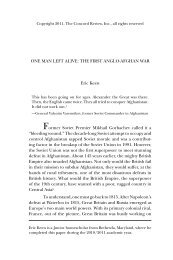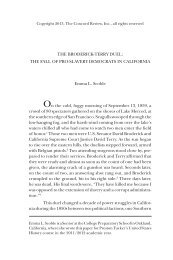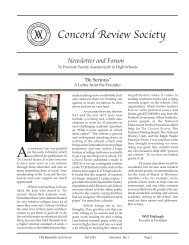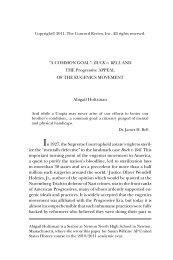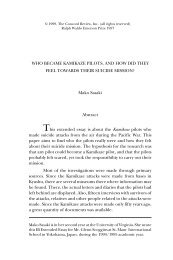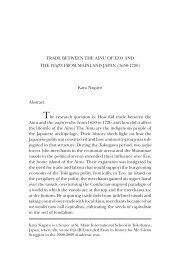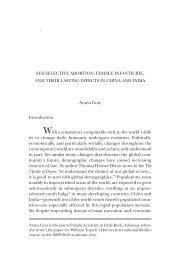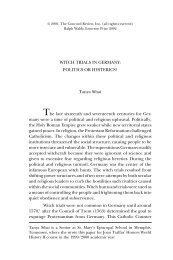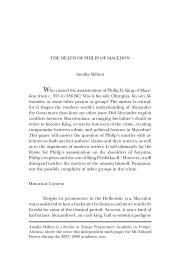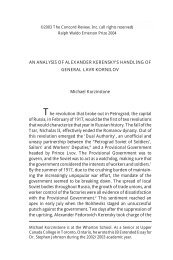THE SOVIET-AFGHAN WAR Colin Rhys Hill - The Concord Review
THE SOVIET-AFGHAN WAR Colin Rhys Hill - The Concord Review
THE SOVIET-AFGHAN WAR Colin Rhys Hill - The Concord Review
You also want an ePaper? Increase the reach of your titles
YUMPU automatically turns print PDFs into web optimized ePapers that Google loves.
46 <strong>Colin</strong> <strong>Rhys</strong> <strong>Hill</strong><br />
puppet government. Even within this seemingly clear goal, there<br />
were subtle (though important) differences. This can be traced<br />
back to three main causes: ethnicity, ideology, and nationality.<br />
In the realm of ethnicity, various factions held various<br />
ethnic majorities. Ahmed Shah Massoud, perhaps the most wellknown<br />
Afghan Mujahideen, was a Tajik (an ethnic minority) and<br />
his forces were predominantly Tajik: they fought for both ethnic<br />
equality with the majority Pashtun and the defeat of the 40th<br />
Army. 168 <strong>The</strong> Pashtun (Afghanistan’s ethnic majority, about 53<br />
percent of the total population) fought in Mujahideen factions<br />
whose beliefs ranged from a united Afghanistan to a Pashtundominated<br />
Afghanistan. 169 This pattern continued with other<br />
minorities such as the Hazaras, Uzbeks, and Turkmen.<br />
Ideology also separated Mujahideen factions. Islamic<br />
beliefs were liberal, moderate, or fundamentalist depending on<br />
a faction’s religious dogma. 170 Political beliefs were as varied as<br />
religious beliefs: some factions preferred a totalitarian Sharia state,<br />
others looked to Iran, still others believed in democracy, and some<br />
even wanted a return to traditional tribal governance.<br />
Nationality was a rarer, but still prevalent, source of motivation.<br />
At first, this appears to be an obvious observation. After<br />
all, most of the Mujahideen were Afghans who were fighting to<br />
regain control of their country. However, the most common foreign<br />
Jihadist, the Arab Mujahideen, had different motivations. Afghan<br />
Jihadists would complain that Arabs (such as Osama Bin Laden)<br />
were simply there for “Jihad credit” and were more interested in<br />
taking videos than actually fighting the 40th Army. 171 Thus their<br />
Soviet-Afghan War was more of a rite of passage than a struggle<br />
for independence.<br />
Actions<br />
Afghan author/professor Hassan Kakar remarks that “<strong>The</strong><br />
(Soviet) invasion turned the civil war into a war of liberation.” 172



